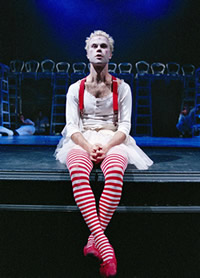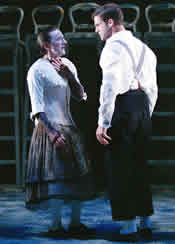 Elevate
Me Later
Elevate
Me Later
By Martin Harries
A Midsummer Night's Dream
By William Shakespeare
BAM Harvey Theater
(closed)
A Midsummer Night's Dream is a
play about spirits, but it also a play about bodies. The Midsummer
recently brought to BAM by the British company Propeller, Edward
Hall's all-male ensemble, has a thousand virtues, and chief among
them is its emphasis on the body. There is no flying by Foy. There
are no blithe Victorian angels. When bodies fall, they fall hard.
Propeller's spirits have bodies. Even Puck -- especially this
Puck, the superb Simon Scardifield -- has a body.
There is something gross here, something
good and gross. I will explain, and begin with the word.
Late in Midsummer, Theseus (Matthew
Flynn), speaking with the mechanicals' play in mind, declares:
"This palpable gross play hath well beguiled/ The heavy gait of
night." Theseus is of course also speaking of Shakespeare's play.
As Midsummer ends, the line between the play-within-the-play
and the play proper grows increasingly slim. Propeller's audience
is particularly likely to think Theseus is speaking about the
Midsummer they have just witnessed.
"Gross." Propeller made me think about
this word. What does Theseus mean when he calls the mechanicals'
"tedious and brief scene," that slapstick version of the comic
story of Pyramus and Thisby, "gross"? Is it disgusting to him?
The play itself offers a hint about what
"gross" might mean. Titania (Sam Callis) promises Bottom:
I'll give thee fairies to attend on thee,
And they shall fetch thee jewels from the deep,
And sing while thou on pressèd flowers dost sleep;
And I will purge thy mortal grossness so
That thou shalt like an airy spirit go.
Bottom, of course, never does go like an
airy spirit or any other kind. Indeed, Propeller's excellent Bottom,
Tony Bell, becomes more than usually weighed down by "mortal grossness"
once he is transformed into an ass. His weaver's spindle morphs
into a donkey schlong forever flapping between his legs. The play's
joke is that, while under the influence of the drug love-in-idleness,
Titania cannot see just how bestial, how ridiculous, how mortal
-- in short, how "gross" -- Bottom has become. In Hall's production,
this joke is emphasized as Titania ogles Bottom's member. Which
again raises the question: what does "gross" mean here?
The Oxford English Dictionary
is helpful: "Glaring, flagrant, monstrous"; "Wanting in fineness
or delicacy of texture"; "Lacking in delicacy of perception; dull
stupid"; "Rude, uninstructed, ignorant"; "Extremely coarse in
behavior or morals; brutally lacking in refinement or delicacy."
Shades of all these meanings are in play, but the OED
singles one out: Titania's lines are quoted to exemplify "Thickness,
density, materiality, solidity."
Propeller's Midsummer, this "palpable
gross play," folds the grossness of mortality back into the grossness
of the body. It does not aspire, with Titania, to purge mortal
grossness, but celebrates it.
Recall that all the bodies on stage in
the Propeller Midsummer are male. Edward Hall, director
of the fine ensemble, claims that the inspiration for this choice
was fidelity to the conditions of Shakespeare's original productions.
There is something faintly old-fashioned in his reasoning; he
writes in the current American Theatre, for instance,
that the male actors in Shakespeare's time made the plays more
about "the idea of love" than about, say, sex--an effect presumably
reproducible today.
 There's
every reason to believe that Shakespeare's audiences knew that
boys played the women. I don't know of evidence, however, that
these boys were anything but convincing drag artists. They were
sexy. Unlike Hall's actors, they probably had very little body
hair showing, and they weren't balding (like Robert Hands, who
plays Helena for Propeller). Propeller's women do not look like
women. "But ultimately," says Hall of his company's work, "we
strive to create a different creature, to transcend any literal
idea of gender." Thus, when I say there's something old-fashioned
in Hall's reasoning, I mean that in theory he wants to swerve
away from the specifically queer energies that critics from Oscar
Wilde to Jonathan Goldberg have seen in the casting of boys as
women.
There's
every reason to believe that Shakespeare's audiences knew that
boys played the women. I don't know of evidence, however, that
these boys were anything but convincing drag artists. They were
sexy. Unlike Hall's actors, they probably had very little body
hair showing, and they weren't balding (like Robert Hands, who
plays Helena for Propeller). Propeller's women do not look like
women. "But ultimately," says Hall of his company's work, "we
strive to create a different creature, to transcend any literal
idea of gender." Thus, when I say there's something old-fashioned
in Hall's reasoning, I mean that in theory he wants to swerve
away from the specifically queer energies that critics from Oscar
Wilde to Jonathan Goldberg have seen in the casting of boys as
women.
Practice, however, is a different matter.
A production all about the "idea of love" would be lovely, I suppose,
but that's not what I see in this Midsummer. It is as
though Titania speaks for Hall: he wants his actors to purge their
"mortal grossness." This is a lot to purge, and happily it never
happens. Hall's theory may have been an enabling fiction. His
ensemble may indeed have striven to transcend "any literal idea
of gender" (whatever that means), but this Midsummer
stages the human frustrations that very often attend such striving.
Indeed, in this production a hilarious yet bittersweet aura surrounds
this failure of bodily transcendence.
Jonathan McGuinness's memorable performance
exemplifies the production's brew of the melancholic and the slapstick.
As Hermia, McGuinness' body is always leaning towards someone,
his hands are always in motion, his eyes dart. As his voice comes
close to breaking, its yearning returns him to the very body he
seems to want to abandon. (That McGuinness also plays the laconic
Snug the Joiner, who leans timorously away from his artisan companions,
and the play-within-the-play's cowardly lion, makes the physical
effect richer.) McGuinness's body has clearly not purged the "mortal
grossness" of gender; it is a man's body. Which is why his performance
can be at once comic and melancholic: the effect comes from his
fine playing of the line between desire and fulfillment.
That mixture of comedy and melancholy is
the strength of this production. Take, for instance, the great
short scene where the two pairs of lovers have come to the end
of their wanderings in the woods. "Methinks I see these things
with parted eye,/ When everything seems double," says Hermia.
Everything is double, for characters and audience alike, and the
four actors convey the bewilderment wonderfully well. They also
convey, however, the pleasure they find in the confusion itself;
they are already slightly nostalgic for the night they have just
passed. No more love-in-idleness. Now they must throw away childish
things and love the people they are supposed to love.
As this production ends, Puck is sad about
the process of setting things straight. In his ludicrous tutu
and striped red and white tights, Scardifield knows that we are
about to leave and go off and be ourselves. It's gross.
